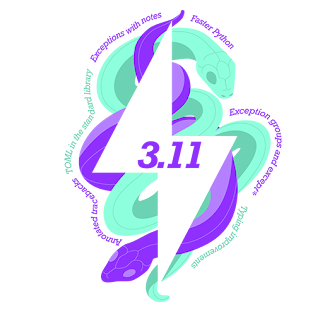This is the sixth maintenance release of Python 3.11
Python 3.11.7 is the newest major release of the Python programming language, and it contains many new features and optimizations. Get it here:
https://www.python.org/downloads/release/python-3117/
Major new features of the 3.11 series, compared to 3.10
Among the new major new features and changes so far:
- PEP 657 – Include Fine-Grained Error Locations in Tracebacks
- PEP 654 – Exception Groups and except*
- PEP 673 – Self Type
- PEP 646 – Variadic Generics
- PEP 680 – tomllib: Support for Parsing TOML in the Standard Library
- PEP 675 – Arbitrary Literal String Type
- PEP 655 – Marking individual TypedDict items as required or potentially-missing
- bpo-46752 – Introduce task groups to asyncio
- PEP 681 – Data Class Transforms
- bpo-433030– Atomic grouping ((?>…)) and possessive quantifiers (
*+, ++, ?+, {m,n}+) are now supported in regular expressions. - The Faster Cpython Project is already yielding some exciting results. Python 3.11 is up to 10-60% faster than Python 3.10. On average, we measured a 1.22x speedup on the standard benchmark suite. See Faster CPython for details.
More resources
- PEP 664, 3.11 Release Schedule
- Report bugs at https://bugs.python.org.
And now for something completely different
A pentaquark is a human-made subatomic particle, consisting of four quarks and one antiquark bound together; they are not known to occur naturally, or exist outside of experiments specifically carried out to create them.
Quarks quarks have a baryon number of +1/3 and antiquarks of -1/3, the pentaquark would have a total baryon number of 1, and thus would be a baryon. Further, because it has five quarks instead of the usual three found in regular baryons (a.k.a. 'triquarks'), it is classified as an exotic baryon. The name pentaquark was coined by Claude Gignoux and Harry J. Lipkin in 1987; however, the possibility of five-quark particles was identified as early as 1964 when Murray Gell-Mann first postulated the existence of quarks. Although predicted for decades, pentaquarks proved surprisingly difficult to discover and some physicists were beginning to suspect that an unknown law of nature prevented their production.
We hope you enjoy the new releases!
Thanks to all of the many volunteers who help make Python Development and these releases possible! Please consider supporting our efforts by volunteering yourself or through organization contributions to the Python Software Foundation.Your friendly release team,
Ned Deily @nad
Steve Dower @steve.dower
Pablo Galindo Salgado @pablogsal

